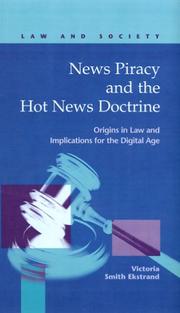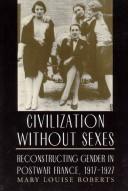| Listing 1 - 9 of 9 |
Sort by
|
Book
Year: 1961 Publisher: Paris : Institut Français de Presse,
Abstract | Keywords | Export | Availability | Bookmark
 Loading...
Loading...Choose an application
- Reference Manager
- EndNote
- RefWorks (Direct export to RefWorks)
Journalists --- Copyright --- Journalistes --- Legal status, laws, etc. --- Newspaper articles --- Droit
Book
Year: 1962 Publisher: Paris : Institut Français de Presse, Université de Paris; Dépositaire: Librairies Techniques,
Abstract | Keywords | Export | Availability | Bookmark
 Loading...
Loading...Choose an application
- Reference Manager
- EndNote
- RefWorks (Direct export to RefWorks)
Journalists --- Copyright --- Journalistes --- Legal status, laws, etc. --- Newspaper articles --- Droit
Dissertation
Abstract | Keywords | Export | Availability | Bookmark
 Loading...
Loading...Choose an application
- Reference Manager
- EndNote
- RefWorks (Direct export to RefWorks)
Doelstelling: Deze masterproef handelt over causale coherentierelaties in Engelse bronteksten en hun Nederlandse vertalingen. Aan de hand van een krantencorpus en een romancorpus worden de frequentie en de vertaling in het Nederlands van zes Engelse causale uitdrukkingen (of connectieven) "because, so, because of, since, therefore en thus" bestudeerd. We onderzoeken deze connectieven binnen de drie domeinen die Sweetser (1990) voorstelt: het content domein (volitional of non-volitional), het epistemische domein en het speech act domein. Daarnaast bekijken we of de expliciete causale uitdrukkingen in de bronteksten expliciet vertaald worden of impliciet blijven in de doelteksten. Middelen of methode: Het krantencorpus bestaat uit artikels in drie Engelse kranten en de bijhorende vertalingen gepubliceerd in drie Vlaamse kranten. Het romancorpus omvat drie Engelse romans en de Nederlandse vertalingen. Gealigneerde zinnen uit beide corpora worden aan de hand van Kwalitan toegewezen aan een of meerdere van Sweetsers domeinen. Resultaten: "Because" blijkt de meest frequente causale uitdrukking en "thus" komt het minst voor. De meest voorkomende vertalingen zijn "omdat, want, dus en daarom." Vaak zijn de causale uitdrukkingen tegelijk voorbeelden van content relaties en epistemische relaties. De expliciete uitdrukking van connectieven in de brontekst wordt grotendeels behouden in de doeltekst: ongeveer 80% van de Engelse causale uitdrukkingen wordt in het Nederlands geëxpliciteerd.
Causal expressions. --- Causality. --- Content-epistemic-speech act. --- Corpus-based study. --- Discourse domains. --- English-Dutch. --- Explicit-implicit. --- Newspaper articles. --- Novels. --- Sweetser. --- Vertaalkundige studie – Onderzoek van vertalingen – schriftelijke taal.
Book
ISBN: 9781787448070 9781783275878 1800100957 178744807X 1783275871 Year: 2021 Publisher: Woodbridge The Boydell Press
Abstract | Keywords | Export | Availability | Bookmark
 Loading...
Loading...Choose an application
- Reference Manager
- EndNote
- RefWorks (Direct export to RefWorks)
Using a very wide range of detailed sources, the book surveys the many different experiences of women during the Second World War.
World War, 1939-1945 --- Women. --- Women --- 1939-1945 --- Second World War. --- Women's experiences. --- cultural impact. --- everyday life. --- exile. --- gender roles. --- historical context. --- newspaper articles. --- occupation. --- oral interviews. --- personal letters. --- resilience. --- social history. --- social impact. --- war.
Dissertation
ISBN: 3929122588 Year: 1998 Publisher: Bonn ZV
Abstract | Keywords | Export | Availability | Bookmark
 Loading...
Loading...Choose an application
- Reference Manager
- EndNote
- RefWorks (Direct export to RefWorks)
Theses --- Copyright and electronic data processing --- Copyright --- Literary property --- Property, Literary --- Intangible property --- Intellectual property --- Anti-copyright movement --- Authors and publishers --- Book registration, National --- Patent laws and legislation --- Electronic data processing and copyright --- Copyright infringement --- Fair use (Copyright) --- Newspaper articles --- Law and legislation

ISBN: 1593321678 9781593321673 9781593320751 1593320752 Year: 2005 Publisher: New York : LFB Scholarly Pub.,
Abstract | Keywords | Export | Availability | Bookmark
 Loading...
Loading...Choose an application
- Reference Manager
- EndNote
- RefWorks (Direct export to RefWorks)
Journalists --- Copyright --- Piracy (Copyright) --- Copyright and electronic data processing. --- Internet --- Cyberspace --- Electronic data processing and copyright --- Copyright infringement --- Fair use (Copyright) --- Literary property --- Property, Literary --- Intangible property --- Intellectual property --- Anti-copyright movement --- Authors and publishers --- Book registration, National --- Patent laws and legislation --- Legal status, laws, etc. --- Newspaper articles --- Law and legislation. --- Law and legislation
Book
ISBN: 1282763997 9786612763991 0520946111 9780520946118 9781282763999 661276399X 0520262255 9780520262256 0520262263 9780520262263 Year: 2010 Publisher: Berkeley University of California Press
Abstract | Keywords | Export | Availability | Bookmark
 Loading...
Loading...Choose an application
- Reference Manager
- EndNote
- RefWorks (Direct export to RefWorks)
This is the incredible story of Bao Luong, Vietnam's first female political prisoner. In 1927, when she was just 18, Bao Luong left her village home to join Ho Chi Minh's Revolutionary Youth League and fight both for national independence and for women's equality. A year later, she became embroiled in the Barbier Street murder, a crime in which unruly passion was mixed with revolutionary ardor. Weaving together Bao Luong's own memoir with excerpts from newspaper articles, family gossip, and official documents, this book by Bao Luong's niece takes us from rural life in the Mekong Delta to the bustle of colonial Saigon. It provides a rare snapshot of Vietnam in the first decades of the twentieth century and a compelling account of one woman's struggle to make a place for herself in a world fraught with intense political intrigue.
Women revolutionaries --- Women political prisoners --- Nguyẽ̂n, Trung Nguyệt. --- Ho Chi Minh City (Vietnam) --- Social conditions --- 1927. --- 20th century. --- bao luong. --- barbier street murder. --- betrayal. --- colonial saigon. --- crime and punishment. --- crime. --- dramatic. --- engaging. --- female prisoners. --- fight for freedom. --- high profile case. --- ho chi minh. --- mekong delta. --- memoir and autobiography. --- national independence. --- newspaper articles. --- nonfiction account. --- official documents. --- oral history. --- passion. --- political intrigue. --- political prisoners. --- prison stories. --- revolution. --- revolutionaries. --- revolutionary youth league. --- rural life. --- vietnam. --- womans struggle. --- womens equality. --- Nguyen, Trung Nguyet.
Book
ISBN: 9781843838524 1843838524 9781782041627 1782041621 Year: 2013 Volume: 3 Publisher: Suffolk Boydell & Brewer
Abstract | Keywords | Export | Availability | Bookmark
 Loading...
Loading...Choose an application
- Reference Manager
- EndNote
- RefWorks (Direct export to RefWorks)
The Norman Conquest is one of the most significant events in British history - but how is it actually remembered and perceived today? This book offers a study of contemporary British memory of the Norman Conquest, focussing on shared knowledge, attitudes and beliefs. A major source of evidence for its findings are references to the Norman Conquest in contemporary British newspaper articles: 807 articles containing references to the Conquest were collected from ten British newspapers, covering a recent three year period. A second important source of information is a quantitative survey for which a representative sample of 2000 UK residents was questioned. These sources are supplemented by the study of contemporary books and film material, as well as medieval chronicles for comparative purposes, and the author also drawns on cultural theory to highlight the characteristics and functions of distant memory and myth. The investigation culminates in considering the potential impact of memory of the Norman Conquest in Britain today. Siobhan Brownlie is a Lecturer in the School of Arts, Languages & Cultures at the University of Manchester.
Normans --- Public opinion --- Collective memory --- Normands (Français) --- Opinion publique --- Mémoire collective --- Opignion publique --- Great Britain --- Grande-Bretagne --- History --- Historiography. --- Histoire --- Historiographie --- Historiography --- Public opinion. --- Normands (Français) --- Mémoire collective --- Normans - Great Britain - Historiography --- Public opinion - Great Britain --- Collective memory - Great Britain --- Great Britain - History - William I, 1066-1087 - Historiography --- Collective remembrance --- Common memory --- Cultural memory --- Emblematic memory --- Historical memory --- National memory --- Public memory --- Social memory --- Memory --- Social psychology --- Group identity --- National characteristics --- Northmen --- Attitudes. --- Beliefs. --- Contemporary British Memory. --- Distant Memory. --- Impact. --- Myth. --- Newspaper Articles. --- Norman Conquest. --- Quantitative Survey. --- William --- Military leadership.

ISBN: 1282070185 9786612070181 0226721272 9780226721279 9780226721217 0226721213 0226721221 9780226721224 0226721213 9780226721217 9781282070189 6612070188 Year: 1994 Publisher: Chicago University of Chicago Press
Abstract | Keywords | Export | Availability | Bookmark
 Loading...
Loading...Choose an application
- Reference Manager
- EndNote
- RefWorks (Direct export to RefWorks)
In the raucous decade following World War I, newly blurred boundaries between male and female created fears among the French that theirs was becoming a civilization without sexes. This new gender confusion became a central metaphor for the War's impact on French culture and led to a marked increase in public debate concerning female identity and woman's proper role. Mary Louise Roberts examines how in these debates French society came to grips with the catastrophic horrors of the Great War. In sources as diverse as parliamentary records, newspaper articles, novels, medical texts, writings on sexology, and vocational literature, Roberts discovers a central question: how to come to terms with rapid economic, social, and cultural change and articulate a new order of social relationships. She examines the role of French trauma concerning the War in legislative efforts to ban propaganda for abortion and contraception, and explains anxieties about the decline of maternity by a crisis in gender relations that linked soldiery, virility, and paternity. Through these debates, Roberts locates the seeds of actual change. She shows how the willingness to entertain, or simply the need to condemn, nontraditional gender roles created an indecisiveness over female identity that ultimately subverted even the most conservative efforts to return to traditional gender roles and irrevocably altered the social organization of gender in postwar France.
Sex role --- Women --- World War, 1914-1918 --- European War, 1914-1918 --- First World War, 1914-1918 --- Great War, 1914-1918 --- World War 1, 1914-1918 --- World War I, 1914-1918 --- World War One, 1914-1918 --- WW I (World War, 1914-1918) --- WWI (World War, 1914-1918) --- History, Modern --- Gender role --- Sex (Psychology) --- Sex differences (Psychology) --- Social role --- Gender expression --- Sexism --- History --- Social conditions. --- Social aspects --- Sex role - France - History - 20th century. --- Women - France - Social conditions. --- World War, 1914-1918 - Social aspects - France. --- World War, 1914-1918 - Women - France. --- Gender roles --- Gendered role --- Gendered roles --- Role, Gender --- Role, Gendered --- Role, Sex --- Roles, Gender --- Roles, Gendered --- Roles, Sex --- Sex roles --- gender, postwar, wartime, history, historical, wwi, world war, france, french, europe, european, 1900s, 20th century, reconstruction, roles, academic, scholarly, research, culture, cultural, parliament, primary source, newspaper, articles, novels, medical, sexology, vocational, literature, literary, women, woman, maternity, family, social studies.
| Listing 1 - 9 of 9 |
Sort by
|

 Search
Search Feedback
Feedback About UniCat
About UniCat  Help
Help News
News